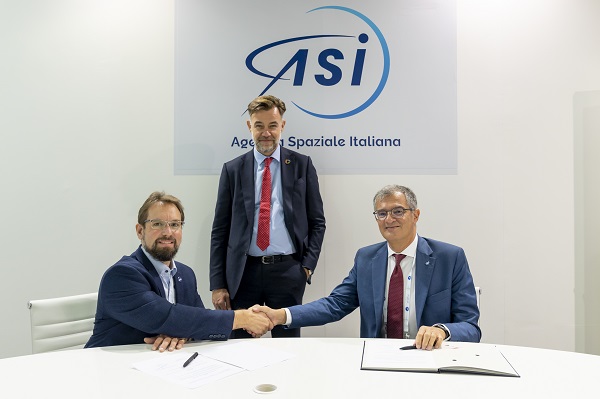 L-R: Marc Serres, CEO of LSA; Franz Fayot, Luxembourg's Minister of the Economy; Giorgio Saccoccia, President of ASI;
Credit: SIP / Emmanuel Claude
L-R: Marc Serres, CEO of LSA; Franz Fayot, Luxembourg's Minister of the Economy; Giorgio Saccoccia, President of ASI;
Credit: SIP / Emmanuel Claude
Italy and Luxembourg today signed a memorandum of understanding (MoU) on space cooperation.
On Tuesday 26 October 2021, Marc Serres, CEO of the Luxembourg Space Agency (LSA), and Giorgio Saccoccia, President of the Italian Space Agency (Agenzia Spaziale Italiana - ASI), signed a MoU aimed at catalysing and deepening cooperation between the Grand Duchy and Italy in the field of space.
According to LSA, the agreement will serve as a vehicle to establish a framework of cooperation, sharing of expertise and exchange of information between the two agencies. It also aims to strengthen collaboration by identifying projects of common interest, for example in the fields of civil space exploration and sustainable utilisation of space resources, science, and technology and applications. The MoU will further facilitate research, exploration, development and use of space, not only by the two countries, but also by academic and research institutes and private sector space companies.
Moreover, the MoU will strengthen policy coordination as the two countries contribute promoting the principles of current international law and fostering innovation and investment in space resources exploration and utilisation on the international space stage.
Luxembourg's Minister of the Economy, Franz Fayot, stated: "The memorandum offers a platform from which both Luxembourg and Italy can move forward together on collaborations and projects in space, and space resources utilisation. Italy and Luxembourg have been collaborating successfully on a number of space projects already. The agreement between our two space agencies is yet another important step forward in enhancing international cooperation".
ASI President Giorgio Saccoccia added: "The signature of the MoU today underlines the common will of our two space agencies and countries to advance in their bilateral cooperation and join forces in many sectors of space that are considered strategic for the future".








